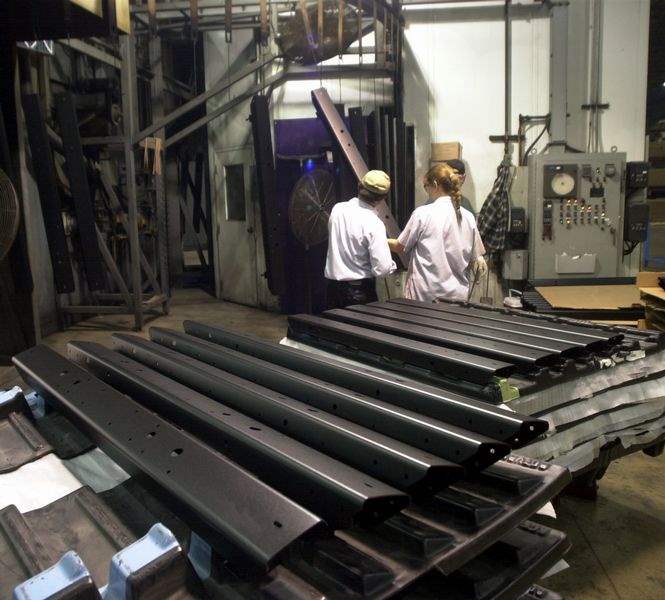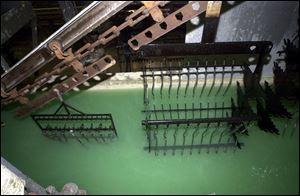
Dana at forefront of movement to share its space with outsiders
3/2/2003
Bumpers for Jeep Wranglers are stacked ready for shipment after completing the coating process in Monclova Township.
blade

Parts are lowered into a bath as they move down the line at MetoKote's factory in Monclova Township.
Toledo's Dana Corp. won't be alone when it starts churning out frames for the upcoming Ford F-150 and Chevrolet Colorado pickups at three North American factories this year.
Instead of putting protective coatings on the frames itself as Dana traditionally has done, the auto parts company opened the factories' doors to a supplier. MetoKote Corp. of Lima, Ohio, installed coating equipment in the factories and will man them, ensuring additional business from Dana with the investment.
Besides saving $24 million to $30 million on coating equipment through the long-term arrangement, Dana got a reliable expert to handle a non-core task it no longer wanted to perform.
Plus, packaging and transportation costs between separate Dana and MetoKote factories will be eliminated.
“The key is, it has to be [cost] competitive. Nobody is doing it because it's clever,” said Dana spokesman Gary Corrigan. “It saves money on the cost of capital, and it saves money in the overall process.”
Such “plant in plant” arrangements are gaining acceptance and may soon be the basis for a Chrysler factory in Canada expected to build the Dodge M80 pickup.
The long-term arrangements are fairly common in South America as outsiders share investment costs to build low-volume vehicles. But few examples are found in North America, and the ones in operation involve suppliers instead of auto assembly plants.
“It's still fairly innovative in thinking,” said Neil De Koker, managing director of the Original Equipment Suppliers Association in Troy, Mich. “There's a limited amount of it going on.”
Lear Corp. of Southfield, Mich., came close a decade ago when it invested in seat-assembling equipment at a former General Motors Corp. plant. GM employees worked the line, but Lear is in the forefront on the idea, said Sean McAlinden, a director at the Center for Automotive Research at the Environmental Research Institute of Michigan in Ann Arbor.
Other businesses have hired outside firms to do traditionally in-house tasks, such as payroll and marketing, and the auto industry is bound to follow, Mr. McAlinden said.
Although such arrangements are favored by the Big Three, who appear less interested in manufacturing except for final assembly, the United Auto Workers and some suppliers are resisting them, Mr. McAlinden said.

Bumpers for Jeep Wranglers are stacked ready for shipment after completing the coating process in Monclova Township.
The UAW doesn't want to lose jobs, although it may be more open if all-new products were involved or work were moved here from overseas, and some suppliers don't want to gamble on one plant, he explained.
Lloyd Mahaffey, the Toledo-based regional director who oversees UAW activities across Ohio, pointed out that having different employers under one roof results in different pay scales, benefits, and working conditions.
“We would be very cautious in moving into that kind of an arrangement,” he said. “Lines get blurred.”
Meanwhile, potential suppliers who would build and run an auto factory's paint shop would spend $400 million to $600 million in Ohio, for example, instead of $4 million to $5 million in Brazil because of stricter environmental standards, Mr. McAlinden said.
Some suppliers are leery of investing money to be tied to one auto plant instead of building their own factories, which could serve multiple customers, he said.
Chrysler may build a Windsor factory complex in which which suppliers would invest while potentially setting up shop inside the factory or at a neighboring industrial park.
The Canadian Auto Workers agreed to the concept, and Chrysler is seeking large government incentives in part to help defray supplier costs, Mr. McAlinden said.
The DaimlerChrysler AG unit is discussing the plan with suppliers and hopes to open a plant by 2005, said spokesman Kerrey Kerr. The concept would create 1,000 Chrysler and 1,500 supplier jobs, she said.
Dana, one of Chrysler's biggest suppliers, wouldn't divulge whether it is discussing such an arrangement.
The Toledo Fortune 500 firm assembled a “rolling chassis” for Chrysler at a nearby factory when it made the Dodge Dakota in Brazil, and it is using the plant to similarly supply other customers, including a bus company, Dana's Mr. Corrigan said.
Both Dana and MetoKote, which doesn't directly supply automakers, are big proponents of situation operations within other companies' factories.
MetoKote began its so-called InSite system with John Deere in 1990 at a plant in Augusta, Ga., coating parts for compact utility tractors.
Such relationships have grown with John Deere and other companies, including auto supplier Tower Automotive, Inc., of Grand Rapids, Mich., and they accounted for about 30 percent of the firm's $200 million in sales last year.
“We've begun to market the program,” said Tim Klopfenstein, who heads MetoKote's program, “and see this as having great growth potential for our company.”
The program's contracts typically last for seven years, and MetoKote guarantees both pricing and start up dates, Mr. Klopfenstein said.
MetoKote can operate on a customer's plant floor or in an adjacent shop while using the same conveyor, and it builds equipment tailored for each client's needs, he said.
The Lima firm has installed coating systems in Dana factories in Texas that will make frames for the Colorado pickup, and in Kentucky and Ontario that will make frames for the redesigned F-150.
There are a number of issues to address with such arrangements, including trust, Mr. Corrigan said. The companies inevitably share data and warehousing, he said.
Dana, however, is willing to have other suppliers inside its walls and to move in with automakers as well, Mr. Corrigan said.
MetoKote is Dana's first in-house supplier.
“It's a step-at-a-time process, but it definitely will change the way the industry is done,” Mr. Corrigan said.